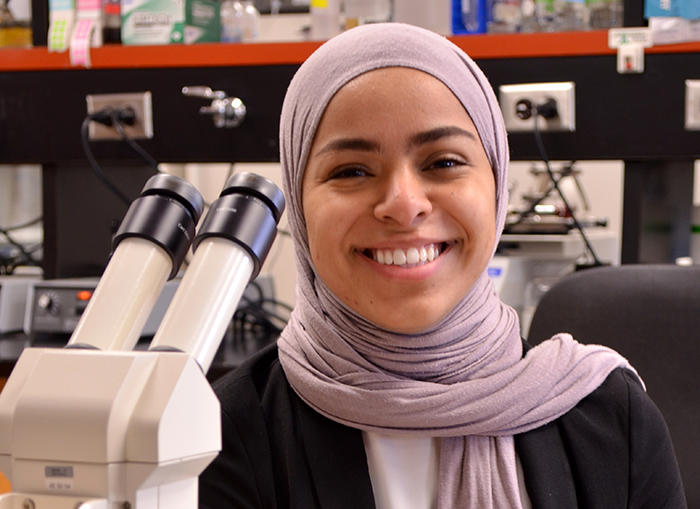We’re taking time over the following weeks to get to know the members of the GSA’s Early Career Scientist Committees. Join us every week to learn more about our early career scientist advocates.
![]()
Haifa Alhadyian
Liaison, Communication and Outreach Subcommittee
University of Kansas
Research Interest:
One of the most fascinating questions in the biological sciences is how an embryo develops from a single fertilized egg into a highly complex organism. Two main processes that contribute to embryonic development are cell division and cell differentiation; however, these are not the only important processes in animal development. In fact, cells change shape, size, and position in response to signaling cues from the surrounding environment. These cues direct divided and differentiated cells to obtain specific properties unique to their function. Dysregulation of cell shapes and movements during embryonic development can lead to severe developmental defects and even embryonic lethality, so it is important to understand how embryos develop to better understand development and disease.
Our lab has identified an unexplored role for occluding junction proteins in the early development of the fruit fly embryo. To further investigate the role of these proteins, I am using the fruit fly ovary as a model system. Results from my work will shed light on this unexplored area of developmental biology, which as a result will advance our understanding of the molecular and cellular mechanisms that regulate animal formation and disease.
As a PhD-trained scientist, you have many career options. What career paths interest you the most?
I am passionate about science, and I am particularly passionate about teaching and research, so my ideal career is a principal investigator who runs a laboratory in an academic institution in my home country. I will transfer the knowledge I have gained in graduate school in the US to the existing scientific knowledge in Saudi universities. Specifically, I will introduce the concept of using model organisms, such as fruit flies and worms, in basic research, which will provide a new and fascinating area of research for Saudi scientists to explore.
After obtaining my PhD, I will have the skills needed to lead research projects, so the other career option that I could see myself in is a researcher in an industry job. Although my Master’s and PhD research are focused on developmental biology, I would want to work in companies/labs that are interested in cancer research or rare diseases using model organisms as biological systems.
In addition to your research, how else do you want to advance the scientific enterprise?
Communicating science to the public is an important task that every scientist should practice because it has an enormous impact on advancing the scientific enterprise. While in graduate school, I have helped lead and organize many programs related to science education, science communication, and professional development. One of the major programs I have led is Saudi Arabia DNA Day, which is a project by the DNA Day Network to establish a DNA Day program in Saudi Arabia with the aim of introducing the importance of model organisms in basic research to high school students. Through this program, I trained 12 college students on how to communicate in science, establish a professional network, and be active voices for science. The program was recognized by school principals and hopefully will be a continuous program. I also helped develop a model organism module for Kansas DNA Day. For this, I implemented a program where I was able to stress the importance of model organisms in advancing biomedical research. My efforts toward science communication will continue after graduate school regardless of what career path I will pursue.
As a leader within the Genetics Society of America, what do you hope to accomplish?
Being part of the GSA is an honor for me. I am pleased that I have the opportunity to serve a society that has been supportive of its members for decades. Part of my work with GSA will be communicating major discoveries led by outstanding groups of geneticists to the public. Communicating these discoveries will allow me to build on my current knowledge, which will not only benefit me as a scientist but also as a future educator. In addition to communicating science, I will have the opportunity to build a professional network by working with GSA members and well-known geneticists in the field. Thus, at the end of my appointment as the Education Liaison of the Outreach and Communication Subcommittee, I will gain experience in science communication, expand my professional network, and serve the society.
Previous Leadership Experience
- Program Director – Saudi Arabia DNA Day
- Leadership Curriculum Co-Chair – Jayhawks Breaking Barriers Program – University of Kansas
- Organizer – 2016 SEARCH Symposium – University of Kansas
- Secretary and Outreach Coordinator – Molecular Biosciences Graduate Student Organization – University of Kansas































